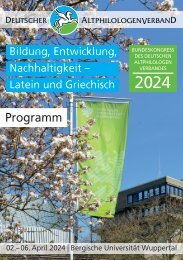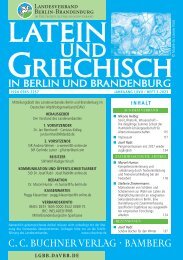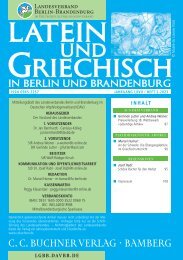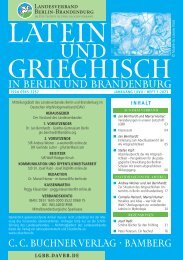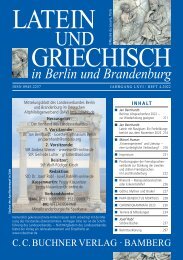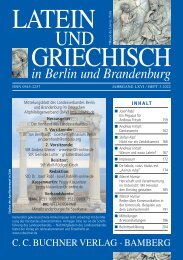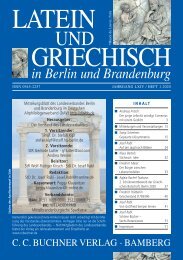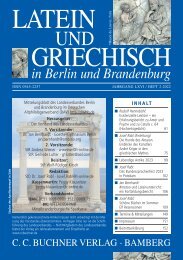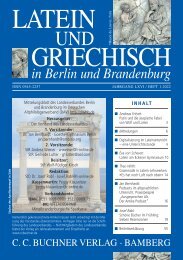DAV_programm_2020_korrektur02
Erfolgreiche ePaper selbst erstellen
Machen Sie aus Ihren PDF Publikationen ein blätterbares Flipbook mit unserer einzigartigen Google optimierten e-Paper Software.
BUNDESKONGRESS
DES DEUTSCHEN
ALTPHILOLOGEN
VERBANDES
2020
MESSAGE OF GREETING
JULIUS-MAXIMILIANS-UNI
BUNDESKONGRESS
DES DEUTSCHEN
ALTPHILOLOGEN
VERBANDES
2020
Message of Greeting
from Euroclassica to the
Deutscher Altphilologenverband
Euroclassica celebrated a silver jubilee in Athens in 2016, and so
it now has a history of nearly thirty years. Germany, through the
DAV, was involved in the creation of Euroclassica in 1991 and has
been an active, contributing member ever since. The period since
cooperation between the associations of Classics teachers in
Europe began has been marked by consistent demands made on
teachers of Classics to justify our position in the curriculum in nearly
all countries. However, while this has been a challenging task, constantly having to justify our existence,
there has been a marked continuity in the provision of classical subjects in most countries and we have not
disappeared from the timetable as many have predicted or even wished.
Each individual country has to make its own case within its own educational tradition, but Euroclassica has
been there to provide support and encouragement in times of challenge and difficulty and also to supply
examples of useful arguments, new resources and methods, and of good and innovative practice.
This exchange of ideas has not only been useful but has helped to promote mutual understanding of our
national positions and to consolidate the European position of the study of Classical languages and culture.
FIEC was created in 1948 for similar reasons: to restore the links between scholars all over the world.
FIEC unites the world of scholarship at university level: Euroclassica attempts to unite the associations of
Classics teachers in schools who not only supply the universities with their students but who introduce the
ancient world to a large number of young people who will not all go on to become specialists.
We have this larger public in mind: those from many different backgrounds who will retain what they learnt
at school about the ancient world as they progress through their lives. As we look back on the history of
Euroclassica we may also perhaps begin to look at the history of
Classics teaching in our own countries. Has Classics been part of
the curriculum since state education of all classes was introduced?
How has this affected the current state of the subject? We are
pleased that nearly all European countries are represented within
Euroclassica, including your own association, and that we now have
a network that stretches from Cyprus to Portugal and from Norway
to Italy. A common European heritage is important to all these
countries, interpreted in different individual ways, and this is one of
the elements which unites those who now live in all the European
countries.
John Bulwer, Former President of Euroclassica (2015–2019)
18
14. bis 18. April 2020 Julius-Maximilians-Universität Würzburg
14. bis 18. April 2020 Julius-Maximilians-Universität Würzburg
19







